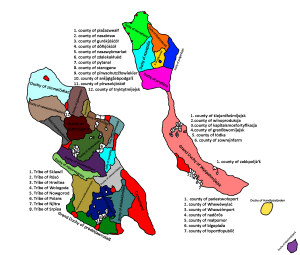
The Kingdom of Ziółkowskigród is situated in the northeastern region of Slavhar and serves as the homeland for the predominantly Sclavinctine population, primarily comprised of Pomorskians and Slovincians, with a notable minority of Rósonics residing in the southern territories. Geographically, Ziółkowskigród encompasses the majority of the Sklawija panhandle, extending its territorial reach to include the western coastline of Fierieja Island and two smaller islands situated further south. This strategic positioning along the Fieriejan coast and islands grants the Kingdom of Ziółkowskigród substantial control over trade regulation between northern and southern realms, effectively imposing significant tariffs on passing ships.
To the south, Ziółkowskigród shares its border with the Empire of Cheese. Internally, the kingdom is divided into distinct administrative regions, including the crownland, a grand duchy, as well as multiple duchies, counties, and tribes. With considerable prosperity and cultural advancement, the country engages in a range of notable exports such as purple dye, various alcoholic beverages, bread, iron, and coal.
In matters of faith, the official religion followed within the Kingdom of Ziółkowskigród is Brewerism. Brewerism places alcohol on a revered pedestal, considering it as a divine entity. The positive aspects of inebriation, such as euphoria, confidence, and resilience, are perceived as bestowed gifts from God, whereas the adverse effects, including vomiting, loss of balance, and hangovers, are viewed as divine retributions.
History
Prior to the feudalization of the Sclavinctine tribes in the northern region of Slavhar, historical records documenting the predecessors of the Ziółkowskigródians are notably scarce. The earliest mention of the Ziółkowski name can be traced back to the establishment of a small duchy known as Starpłehnie'š, founded by Duke Józef Ziółkowski in 803. It is theorized that the Ziółkowski dynasty held a position of authority within one of the Pomorskian Sclavinctine tribes. In 810, the Duchy engaged in a conflict with the Kingdom of Polans to the west when the latter attempted to incorporate Starpłehnie'š into its borders. Emerging victorious from the war, the Duchy united with the Kingdom of Polans in a ceremonious union, forming the Kingdom of Ziółkowskigród. The Duchy's triumph over the Kingdom of Polans can be attributed to the latter's larger size but sparser population, resulting in a scarcity of manpower for the campaign.
Following its establishment, the Kingdom of Ziółkowskigród experienced a period of relative dormancy until the death of Duke Józef Ziółkowski in 850. He was succeeded by King Sławomir Ziółkowski, who undertook military campaigns against the Duchy of Starvopol in 856 and the Kingdom of Skiwiczi in 864, successfully conquering both territories. Upon Sławomir's demise in 890, his marriages with Jółtyka of Góre led to King Rej inheriting the duchies of Nowaplaža, Owherstuw, Nasapłehnieplaža, and Brotomijejsk. Unfortunately, King Rej's reign was marred by brutal governance, resulting in the purging and repression of 6% of the Ziółkowskigródian population, particularly targeting the Slovincians within the Kingdom. Nevertheless, his reign witnessed the complete invasion and conquest of the Kingdom of Centrulguré. Regrettably, King Rej passed away prematurely in 905.
The subsequent monarch, King Włodzimiež, focused extensively on improving the kingdom's trade networks. Recognizing the strategic significance of Fierieja Island, he endeavored to annex the entire island into the kingdom, albeit successfully securing the northeastern section and compelling the Grand Duchy of Wyśpahmijejsk, governed by his distant relative Artyom, to cede individual coastal counties and those near the island's center. Additionally, he compelled his youngest son, Bartoj, to marry Artyom's daughter. King Włodzimiež eventually passed away due to old age in 965, paving the way for his eldest son, Śladusajńy, to ascend the throne. During his reign, Śladusajńy dedicated his efforts to the reconstruction of conquered lands and the enhancement of royal ports. Furthermore, he implemented structural reforms within the kingdom, granting significant territories independent counties, separate from the duchies, while annexing crucial fortifications and ports into the crownland. This reorganization instigated a three-year revolt, which was ultimately quelled in 1000. Śladusajńy's reign concluded in 1010, and he was succeeded by King Bartoj, as he left no direct heir. Bartoj's reign primarily revolved around legitimizing his position as king, quelling numerous rebellions, and fostering the growth of the Ziółkowskigródian workshop economy until his demise in 1052. In the same year, his son Hubert Ziółkowski ascended to the throne, inheriting the Grand Duchy of Wyśpahmijejsk upon his mother's passing in 1055.
King Hubert initiated an invasion of the Duchy of Gaftuchensig in 1059, fully annexing it and renaming it Podgamijejsk. Subsequently, in the 1060s, Hubert dispatched multiple colonial expeditions to the southern Fierieja islands. The first four attempts in 1061, 1063, 1064, and 1066 were unsuccessful. However, in 1068, the landing on Handlpóstjeden proved successful, enabling the Ziółkowskigródian army to establish vassalage over the native population. Finally, the landing on the Duchy of Machmijejsk'š triumphed in 1070. In 1072, both islands rebelled, prompting King Hubert to strip them of their autonomy and subdue the populations through force, thereby reestablishing submission.